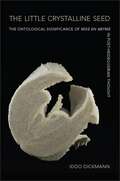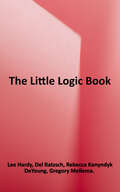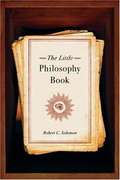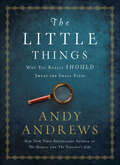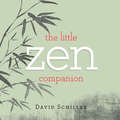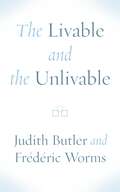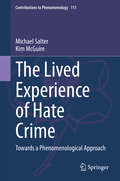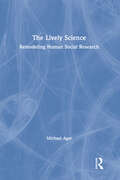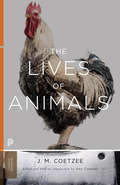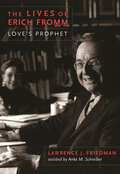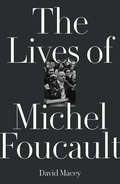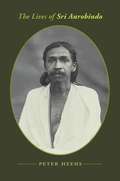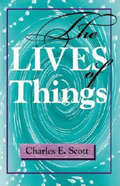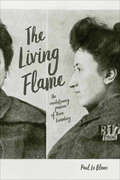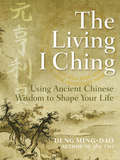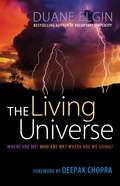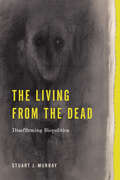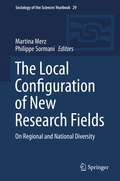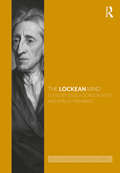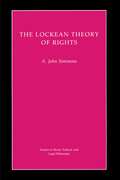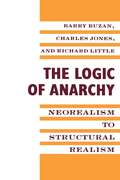- Table View
- List View
The Little Crystalline Seed: The Ontological Significance of Mise en Abyme in Post-Heideggerian Thought (SUNY series, Intersections: Philosophy and Critical Theory)
by Iddo DickmannMise en abyme is a term developed from literary theory denoting a work that doubles itself within itself—a story placed within a story or a play within a play. The term flourished in experimental fiction in midcentury France, having not only a strong impact on contemporary literary theory but also on post-structuralist philosophy. The Little Crystalline Seed focuses on how thinkers invoke the concept of mise en abyme in order to establish ontologies that deviate from that of Heidegger. Iddo Dickmann demonstrates how the concept served in modeling Jacques Derrida's logic of supplementarity; Maurice Blanchot's mechanism of désouvrement; Gilles Deleuze's philosophy of repetition; Emmanuel Levinas's concept of "proximity," and in further circuit: the philosophies of Bergson, Kant, Leibniz, Heidegger himself, and more. Exploring the interpretative and generative potential of the mise en abyme for continental thought, Dickmann reveals new points of resonance between various philosophical topics including, aesthetics, ethics, time, logic, mirroring, play, and signification.
The Little Logic Book
by Rebecca Konyndyk DeYoung Lee Hardy Del Ratzsch Gregory MellemaWritten by four members of the Calvin College philosophy department, this book is a valuable resource for teachers and undergraduate students of philosophy. In addition to providing clear introductions to the modes of reasoning students encounter in their philosophy course readings, it includes a nuanced description of common informal fallacies, a narrative overview of various philosophical accounts of scientific inference, and a concluding chapter on the ethics of argumentation. <p><p>The book features engaging dialogues on social, philosophical and religious issues based on the styles of argument taken up in the chapters. In addition to core concepts, distinctions, explanations, rules of inference, methods of assessment, and examples, The Little Logic Book provides philosophical commentary that will stimulate discussion of the assumptions and implications of various kinds of human reasoning. Free downloadable exercises are available from the publisher.
The Little Philosophy Book
by Robert C. SolomonThe Little Philosophy Book provides a concise and engaging introduction to deep and perennial philosophical questions. In a lively and accessible style, acclaimed author Robert C. Solomon leads students and other readers through an exploration of the self, the universe, and the nature of truth and morality, posing such questions as "Who are we, really?" "Why are we here?" and "How should we live?" The Little Philosophy Book begins with a quick tour of ancient philosophy that ranges from Socrates' Greece, to Vedic India, to Confucian, Daoist, and Buddhist China, and to the Middle East. The book goes on to examine consciousness, from Descartes' "I think, therefore I am" to phenomenology and the mind-body problem. It then considers God, nature, and spirituality; cosmology; freedom and responsibility; and morality and ethics, ending with an examination of happiness and the meaning of life and the role of philosophy in determining both. Solomon covers topics that are often omitted from other introductions, including existentialism, phenomenology, spirituality, and death. Throughout, he incorporates material on key figures and traditions in philosophy, showing how some of history's most important thinkers and movements have addressed fundamental philosophical issues. Major figures are listed at the end of each chapter. An ideal introduction for students and novices, The Little Philosophy Book does not provide any definitive answers to universal philosophical questions, but instead encourages readers to think for themselves and to integrate philosophy into their own lives.
The Little Things: Why You Really Should Sweat the Small Stuff
by Andy AndrewsWall Street Journal BestsellerHave you ever wondered why we spend so much time and energy thinking about the big challenges in our lives when all the evidence proves it&’s actually the little things that change everything? That&’s right… Absolutely everything.Little Things embodies Andy&’s own approach to life and work, detailing for the first time some of the exclusive material that he uses to teach and coach some of the most successful corporations, teams, and individuals around the world. In his unique humorous style, Andy shows how people succeed by actually going against the modern adage, &“don&’t sweat the small stuff&”. By contrast, Andy proves that it is in concentrating on the smaller things that we add value and margin.Discover a new perspective and a game plan for meeting various challenges, such as:Managing life in a society that seems to be constantly offended by something or someoneCreating change that is permanent and not short termDramatically increasing results by harnessing the fraction of margin between second place and firstUnderstanding our spiritual connection with God and how that affects planning and outcomeIdentifying the very moment when asking the question why? multiplies the success of an endeavorRecognizing the smallest details that ensure the greatest success
The Little Zen Companion
by David SchillerWhile it seeks neither to define Zen nor answer its most famous koan (a riddle unanswerable by conventional thinking, in this case the sound of one hand clapping), this bestselling little book with 437,000 copies in print possesses a maverick Zen spirit that points to a different way of looking at the world.With each page featuring a quote, phrase, story, koan, haiku, or poem, Zen Companion combines the feeling and format of a meditation book with 2,500 years of wisdom-from Lao-tzu and Groucho Marx, William Carlos Williams and The Little Prince, D. T. Suzuki and Walker Percy, the Buddha and the Bible, Einstein and Gertrude Stein. It's a celebration of intuition: "If a man wishes to be sure of the road he treads on, he must close his eyes and walk in the dark"-St. John the Cross. Individuality: "Do not seek to follow in the footsteps of the men of old; seek what they sought."-Basho. Uncomplicated nature: "Among twenty snowy mountains/The only moving thing/Was the eye of the blackbird."-Wallace Stevens. Childlike spontaneity: "Goodnight stars. Goodnight air."-Margaret Wise Brown. Irreverent paradox: "Wakuan complained when he saw a picture of bearded Bodhidharma: 'Why hasn't that fellow a beard?'" And above all, the simple pleasure of life lived in the moment. "Chop wood, carry water."
The Livable and the Unlivable
by Judith Butler Frédéric WormsThe unlivable is the most extreme point of human suffering and injustice. But what is it exactly? How do we define the unlivable? And what can we do to prevent and repair it? These are the intriguing questions Judith Butler and Frédéric Worms discuss in a captivating dialogue situated at the crossroads of contemporary life and politics. Here, Judith Butler criticizes the norms that make life precarious and unlivable, while Frédéric Worms appeals to a “critical vitalism” as a way of allowing the hardship of the unlivable to reveal what is vital for us.For both Butler and Worms, the difference between the livable and the unlivable forms the critical foundation for a contemporary practice of care. Care and support, in all their aspects, make human life livable, that is, “more than living.” To understand it, we must draw on the concrete practices of humans who are confronted with the unlivable: the refugees of today and the witnesses and survivors of past violations and genocide. They teach us what is intolerable but also undeniable about the unlivable, and what we can do to resist it. Crafted with critical rigor, mutual respect, and lively humor, the compelling dialogue transcribed and translated in this book took place at the École Normale Supérieure (ENS) on April 11, 2018, at a time when close to two thousand migrants were living in nearby makeshift camps in northern Paris. The Livable and the Unlivable showcases this 2018 dialogue in the context of Butler’s and Worms’s ongoing work and the evolution of their thought, as presented by Laure Barillas and Arto Charpentier in their equally engaging introduction. It concludes with a new afterword that addresses the crises unfolding in our world and the ways a philosophically rigorous account of life must confront them.While this book will be of keen interest to readers of philosophy and cultural criticism, and those interested in vitalism, new materialism, and critical theory, it is a far from merely academic text. In the conversation between Butler and Worms, we encounter questions we all grapple with in confronting the distress and precarity of our times, marked as it is by types of survival that are unlivable, from concentration camps to prisons to environmental toxicity, to forcible displacement, to the Covid pandemic.The Livable and the Unlivable at once considers longstanding philosophical questions around why and how we live, while working to retrieve a philosophy of life for today’s Left.
The Lived Experience of Hate Crime: Towards a Phenomenological Approach (Contributions to Phenomenology #111)
by Michael Salter Kim McGuireThis book approaches the topic of the subjective, lived experience of hate crime from the perspective of Husserlian phenomenology. It provides an experientially well-grounded account of how and what is experienced as a hate crime, and what this reveals about ourselves as the continually reconstituted “subject” of such experiences. The book shows how qualitative social science methods can be better grounded in philosophically informed theory and methodological practices to add greater depth and explanatory power to experiential approaches to social sciences topics. The Authors also highlight several gaps and contradictions within Husserlian analyses of prejudice, which are exposed by attempts to concretely apply this approach to the field of hate crimes.Coverage includes the difficulties in providing an empathetic understanding of expressions of harmful forms of prejudice underlying hate crimes, including hate speech, arising from our own and others’ ‘life worlds’. The Authors describe a ‘Husserlian-based’ view of hate crime as well as a novel interpretation of the value of the comprehensive methodological stages pioneered by Husserl. The intended readership includes those concerned with discrimination and hate crime, as well as those involved in qualitative research into social topics in general. The broader content level makes this work suitable for undergraduate and postgraduate students, even professionals within law enforcement.
The Lively Science: Remodeling Human Social Research
by Michael AgarThe Lively Science is Michael Agar's accessible, idiosyncratic, often humorous, and sometimes controversial explication of his own polestar truth: "Research on humans in their social world by other humans is not a traditional science like the one created by Galileo and Newton." However, if the social world is not a lab, neither is it a collection of random events. The book lays out a clear, straightforward path to carrying out the basic scientific tasks of forming questions and answering them to explore and account for that non-randomness. The author deploys myriad engaging examples drawn from a lifetime of applied and basic research to demonstrate how human science researchers can produce discoveries that are scientifically defensible and useful in the real world. Agar grounds his how-to guide in an approachable discussion of epistemology and draws on thinkers whose writings may be unfamiliar to many social scientists. He blends that work with new intellectual tools, such as complexity theory, disasters research, and conversational analysis. The result is an innovative and practical methodology that is true to the realities and surprises of research by and about humans, yet preserves scientific standards of falsifiability, empiricism, logic, and systematic presentation of results. This book represents the best of Michael Agar's visionary work. With a new foreword by Michael Brown celebrating Agar's enormous contribution to social science methodology, The Lively Science is for all researchers who seek to explore the full potential of a human social science.
The Lives of Animals
by J. M. Coetzee Amy GutmannThe idea of human cruelty to animals so consumes novelist Elizabeth Costello in her later years that she can no longer look another person in the eye: humans, especially meat-eating ones, seem to her to be conspirators in a crime of stupefying magnitude taking place on farms and in slaughterhouses, factories, and laboratories across the world. Costello's son, a physics professor, admires her literary achievements, but dreads his mother's lecturing on animal rights at the college where he teaches. His colleagues resist her argument that human reason is overrated and that the inability to reason does not diminish the value of life; his wife denounces his mother's vegetarianism as a form of moral superiority. At the dinner that follows her first lecture, the guests confront Costello with a range of sympathetic and skeptical reactions to issues of animal rights, touching on broad philosophical, anthropological, and religious perspectives. Painfully for her son, Elizabeth Costello seems offensive and flaky, but--dare he admit it?--strangely on target. In this landmark book, Nobel Prize-winning writer J. M. Coetzee uses fiction to present a powerfully moving discussion of animal rights in all their complexity. He draws us into Elizabeth Costello's own sense of mortality, her compassion for animals, and her alienation from humans, even from her own family. In his fable, presented as a Tanner Lecture sponsored by the University Center for Human Values at Princeton University, Coetzee immerses us in a drama reflecting the real-life situation at hand: a writer delivering a lecture on an emotionally charged issue at a prestigious university. Literature, philosophy, performance, and deep human conviction--Coetzee brings all these elements into play. As in the story of Elizabeth Costello, the Tanner Lecture is followed by responses treating the reader to a variety of perspectives, delivered by leading thinkers in different fields. Coetzee's text is accompanied by an introduction by political philosopher Amy Gutmann and responsive essays by religion scholar Wendy Doniger, primatologist Barbara Smuts, literary theorist Marjorie Garber, and moral philosopher Peter Singer, author of Animal Liberation. Together the lecture-fable and the essays explore the palpable social consequences of uncompromising moral conflict and confrontation.
The Lives of Erich Fromm: Love's Prophet
by Lawrence J. Friedman Anke M. SchreiberThis &“brilliantly comprehensive study&” explores the influential thinker&’s contributions to psychology, philosophy and more—&“academic biography at its best&” (Kirkus, starred review). Erich Fromm was a political activist, psychologist, psychoanalyst, philosopher, and one of the most important intellectuals of the twentieth century. Known for his theories of personality and political insight, Fromm dissected the sadomasochistic appeal of populist dictators. He eloquently championing the virtues of love rooted in joyful contact with others and humanity at large. Admired all over the world, Fromm continues to inspire with his message of universal brotherhood. In the first systematic study of Fromm's influences and achievements, Lawrence J. Friedman revisits the thinker's most important works, including Escape from Freedom and The Art of Loving. He also recounts Fromm's political activism as a founder of Amnesty International, the National Committee for a Sane Nuclear Policy, and other peace groups. Friedman also reveals Fromm's support for anti-Stalinist democratic movements in Central and Eastern Europe and his efforts to revitalize American democracy. Friedman elucidates Fromm's key intellectual contributions, especially his innovative concept of "social character," in which social institutions and practices shape the inner psyche, and he clarifies Fromm's conception of love as an acquired skill. Taking full stock of the thinker's historical and global accomplishments, Friedman portrays a man of immense authenticity and spirituality who made life in the twentieth century more humane than it might have been.
The Lives of Erich Fromm: Love's Prophet
by Lawrence FriedmanErich Fromm was a political activist, psychologist, psychoanalyst, philosopher, and one of the most important intellectuals of the twentieth century. Known for his theories of personality and political insight, Fromm dissected the sadomasochistic appeal of brutal dictators while also eloquently championing love—which, he insisted, was nothing if it did not involve joyful contact with others and humanity at large. Admired all over the world, Fromm continues to inspire with his message of universal brotherhood and quest for lasting peace.The first systematic study of Fromm's influences and achievements, this biography revisits the thinker's most important works, especially Escape from Freedom and The Art of Loving, which conveyed important and complex ideas to millions of readers. The volume recounts Fromm's political activism as a founder and major funder of Amnesty International, the National Committee for a Sane Nuclear Policy, and other peace groups. Consulting rare archival materials across the globe, Lawrence J. Friedman reveals Fromm's support for anti-Stalinist democratic movements in Central and Eastern Europe and his efforts to revitalize American democracy. For the first time, readers learn about Fromm's direct contact with high officials in the American government on matters of war and peace while accessing a deeper understanding of his conceptual differences with Freud, his rapport with Neo-Freudians like Karen Horney and Harry Stack Sullivan, and his association with innovative artists, public intellectuals, and world leaders. Friedman elucidates Fromm's key intellectual contributions, especially his innovative concept of "social character," in which social institutions and practices shape the inner psyche, and he clarifies Fromm's conception of love as an acquired skill. Taking full stock of the thinker's historical and global accomplishments, Friedman portrays a man of immense authenticity and spirituality who made life in the twentieth century more humane than it might have been.
The Lives of Michel Foucault
by David MaceyThe classic biography of the radical French philosopher with a new afterword by acclaimed Foucault scholar Stuart Elden.When he died of an AIDS-related condition in 1984, Michel Foucault had become the most influential French philosopher since the end of World War II. His powerful studies of the creation of modern medicine, prisons, psychiatry, and other methods of classification have had a lasting impact on philosophers, historians, critics, and novelists the world over. But as public as he was in his militant campaigns on behalf of prisoners, dissidents, and homosexuals, he shrouded his personal life in mystery.In The Lives of Michel Foucault -- written with the full cooperation of Daniel Defert, Foucault's former lover -- David Macey gives the richest account to date of Foucault's life and work, informed as it is by the complex issues arising from his writings. In this new edition, Foucault scholar Stuart Elden has contributed a new afterword assessing the contribution of the biography in the light of more recent literature.
The Lives of Sri Aurobindo
by Peter HeehsSince his death in 1950, Sri Aurobindo Ghose has been known primarily as a yogi and a philosopher of spiritual evolution who was nominated for the Nobel Prize in peace and literature. But the years Aurobindo spent in yogic retirement were preceded by nearly four decades of rich public and intellectual work. Biographers usually focus solely on Aurobindo's life as a politician or sage, but he was also a scholar, a revolutionary, a poet, a philosopher, a social and cultural theorist, and the inspiration for an experiment in communal living.Peter Heehs, one of the founders of the Sri Aurobindo Ashram Archives, is the first to relate all the aspects of Aurobindo's life in its entirety. Consulting rare primary sources, Heehs describes the leader's role in the freedom movement and in the framing of modern Indian spirituality. He examines the thinker's literary, cultural, and sociological writings and the Sanskrit, Bengali, English, and French literature that influenced them, and he finds the foundations of Aurobindo's yoga practice in his diaries and unpublished letters. Heehs's biography is a sensitive, honest portrait of a life that also provides surprising insights into twentieth-century Indian history.
The Lives of Things (Studies in Continental Thought)
by Charles E. Scott“[Scott] argues that things have lives beyond our cognitive grasp but are nonetheless formative of memories . . . thought, language, and action” (Choice).In The Lives of Things, Charles E. Scott reconsiders our relationships with ordinary, everyday things and our capacity to engage them in their particularity. He takes up the Greek notion of phusis, or physicality, as a way to point out limitations in refined and commonplace views of nature and the body as well as a device to highlight the often-overlooked lives of things that people encounter. Scott explores questions of unity, purpose, coherence, universality, and experiences of wonder and astonishment in connection with scientific fact and knowledge. He develops these themes with lightness and wit, ultimately articulating a new interpretation of the appearances of things that are beyond the reach of language and thought.“Like Foucault and Levinas before him, though in very different ways, Scott makes an oblique incision into phenomenology . . . [it is] the kind of book to which people dazed by the specters of nihilism will be referred by those in the know.” —David Wood“Refreshing and original.” —Edward S. Casey“This new work situates Scott . . . as a leading American scholar in the Continental tradition. In this important new contribution, he argues that things have lives beyond our cognitive grasp but are nonetheless formative of memories (biological, institutional, and cultural), thought, language, and action. Scott’s argument underscores the importance of the physicality (phusis) of things, which has been sidelined in philosophical thought. Dewey’s and Heidegger’s consideration of physicality and the relation between the pragmatist and Continental traditions are built on to develop an account of phusis that emphasizes animation, lightness, density, and the thereness of physicality. Scott’s analysis of density, luminosity, and physicality in Foucault’s and Heidegger’s work and of the displacement of subjectivity is incisive and critical. His final chapter on nihilism is a significant contribution in rethinking nihilism’s negative connotations and resituating it as allowing for a multiplicity of discourses, for regions of recognition, and for life-affirming experiences. Scott’s wit and personal experiences are woven throughout the text. Highly recommended for upper-division undergraduates through faculty.” —N. A. McHugh, Choice
The Living Flame: The Revolutionary Passion of Rosa Luxemburg
by Paul Le BlancA collection of essays illuminating the historic Polish philosopher, economist, and activist&’s tremendous contributions to revolutionary struggle. Rosa Luxemburg, brilliant early twentieth century German revolutionary, comes alive in a rich set of essays on her life, ideas, and lasting influence. The essays deal not only with her remarkable contributions to political, social and economic theory, but also touch on her vibrant personality and intimate friendships. This collection, the fruit of more than four decades of involvement with Luxemburg's work, simultaneously showcases her penetratingly intellectual, political and deeply humanistic qualities.&“An indispensable contribution to our understanding of Rosa Luxemburg, who emerges as formidable theorist, principled activist, and above all, a fully realized human being . . . . The Living Flame affirms Luxemburg&’s lasting contribution and underscores the relevance of her legacy for our own, very different, age.&” —Helen Scott, author, The Storm of History: Shakespeare&’s Tempest and Capitalism &“A profound and multidimensional investigation of a giant thinker and revolutionary. These [essays] show meticulous historical and theoretical attentiveness and at the same time are hugely timely; a significant contribution to Rosa Luxemburg studies and Marxist theory and history.&” —Dana Mills, author, Rosa Luxemburg: Critical Lives &“Uncommonly nuanced, probing, and also deeply principled explorations. [Le Blanc&’s] mode of engagement nicely compliments that of Rosa Luxemburg and shows us her thoughts as a living and breathing work in progress, not merely echoes from an increasingly distant past. In addition, Le Blanc models how Marxists and Leftists in general might want to relate to one another when we debate complex issues and at times disagree.&” —Axel Fair-Schulz, associate professor at SUNY Potsdam
The Living I Ching
by Deng Ming-DaoFrom the author of 365 Tao and a leading authority on Taoist practice and philosophy comes a completely innovative translation of the classic text of Eastern wisdom, the I Ching. The I Ching, or Book of Changes, is an ancient manual for divining the future. Its basic text is traditionally attributed to the Chinese King Wen, the Duke of Zhou, and the philosopher Confucius. By tossing coins, rolling dice, using a computer, or, more traditionally, counting yarrow stalks, one can create a seemingly random combination of heads or tails, odd or even, yin or yang, to construct six lines (for example, solid for odd numbers or broken for even numbers). These six lines make up a hexagram that provides advice, predictions, and answers to questions on topics from love and career to family and finance. While known mostly as a tool of divination, the I Ching is also a repository of centuries of wisdom. Most of the existing translations offer either dense, scholarly commentary or little more than fortune-cookie platitudes, but in The Living I Ching Deng Ming-Dao takes a more holistic approach. His new translation recovers the true wisdom and philosophy of this ancient classic, so that the I Ching becomes more than just a book of fortune-telling -- it becomes a manual for living.
The Living Universe: Where Are We? Who Are We? Where Are We Going?
by Duane ElginBy the bestselling author of Voluntary Simplicity (over 150,000 sold)• Brings together cutting-edge science and ancient spiritual wisdom to demonstrate that the universe is a living, sentient system and that we are an integral part of it• Explores the power of this new paradigm to move humanity toward a sustainable and promising futureScience has traditionally regarded the universe as mostly made up mostly of inert matter and empty space. At one time this point of view was liberating, part of the Enlightenment-born rationalism that helped humanity free itself from superstition and fear and achieve extraordinary intellectual and technological breakthroughs. But this paradigm has outlived its usefulness. It has led to rampant materialism and environmental degradation—if the universe is essentially dead and we are alive, then the inanimate stuff of the universe should be ours to exploit. But we now know that not only is the view of a dead universe destructive, it is also inaccurate and misleading.In The Living Universe, Duane Elgin brings together evidence from cosmology, biology, physics, and even his participation in NASA-sponsored psychic experiments to show that the universe is permeated by a living field and that we are always in communion with that field of aliveness whether we are conscious of it or not. This is a world-view that, as Elgin explains, is shared by virtually every spiritual tradition, and the implications of it are vast and deep. In a living system, each part is integral to the whole, so each of us is intimately connected to the entire universe. Elgin eloquently demonstrates how our identity manifests itself on a whole series of levels, from subatomic to galactic. We are, he writes, “far more than biological beings—we are beings of cosmic connection and participation.”To confront our ongoing planetary crisis of dwindling resources and escalating conflict, we need to move past an ideology of separation, competition, and exploitation. Duane Elgin asks us to see humanity sharing in the same field of aliveness, to discover how to live sustainably and harmoniously within the living universe.
The Living from the Dead: Disaffirming Biopolitics (RSA Series in Transdisciplinary Rhetoric)
by Stuart J. MurrayIn a society that aims above all to safeguard life, how might we reckon with ethical responsibility when we are complicit in sacrificial economies that produce and tolerate death as a necessity of life?Arguing that biopower can be fully exposed only through an analysis of those whom society has “let die,” Stuart J. Murray employs a series of transdisciplinary case studies to uncover the structural and rhetorical conditions through which biopower works. These case studies include the concept of “sacrifice” in the “war” against COVID-19, where emergent cultures of pandemic “resistance” are explored alongside suicide bombings and military suicides; the California mass hunger strikes of 2013; legal cases involving “preventable” and “untimely” childhood deaths, exposing the irreconcilable claims of anti-vaxxers and Indigenous peoples; and the videorecording of the death of a disabled Black man. Murray demonstrates that active resistance to biopower inevitably reproduces tropes of “making live” and “letting die.” His counter to this fact is a critical stance of disaffirmation, one in which death disrupts the politics of life itself.A philosophically nuanced critique of biopower, The Living from the Dead is a meditation on life, death, power, language, and control in the twenty-first century. It will appeal to students and scholars of rhetoric, philosophy, and critical theory.
The Local Configuration of New Research Fields
by Martina Merz Philippe SormaniThis new Yearbook addresses the question of how policy, place, and organization are made to matter for a new research field to emerge. Bringing together leading historians, sociologists, and organizational researchers on science and technology, the volume answers this question by offering in-depth case studies and comparative perspectives on multiple research fields in their nascent stage, including molecular biology and materials science, nanotechnology, and synthetic biology. The Yearbook brings to bear the lessons of constructivist ethnography and the "practice turn" in Science and Technology Studies (STS) more broadly on the qualitative, comparative, and critical inquiry of new research fields. In doing so, it offers unprecedented insights into the complex interplay of national research policies, regional clusters, particular research institutions, and novel research practices in and for any emerging field of (techno-)science. It systematically investigates national and regional differences, including the variable mobilization of such differences, and probes them for organizational topicality and policy relevance.
The Lockean Mind (Routledge Philosophical Minds)
by Jessica Gordon-Roth Shelley WeinbergJohn Locke (1632–1704) is considered one of the most important philosophers of the modern era and the first of what are often called ‘the Great British Empiricists.’ His major work, An Essay Concerning Human Understanding, was the single most widely read academic text in Britain for fifty years after its publication and set new limits to the scope and certainty of what we can claim to know about ourselves and the natural world. The Declaration of Independence and the United States Constitution were both highly influenced by Locke’s libertarian philosophical ideas, and Locke continues to have an impact on political thought, both conservative and liberal. It is less commonly known that Locke was a practicing physician, an influential interpreter of the Bible, and a policy maker in the English Carolina colonies. The Lockean Mind provides a comprehensive survey of Locke’s work, not only placing it in its historical context but also exploring its contemporary significance. Comprising almost sixty chapters by a superb team of international contributors, the volume is divided into twelve parts covering the full range of Locke’s thought: Historical Background Locke’s Interlocutors Locke’s Epistemology Locke’s Philosophy of Mind Locke on Philosophy of Language and Logic Locke’s Metaphysics Locke’s Natural Philosophy Locke’s Moral Philosophy Locke on Education Locke’s Political Philosophy Locke’s Social Philosophy Locke on Religion Essential reading for students and researchers in philosophy, Locke’s work is central to epistemology; metaphysics; philosophy of mind; philosophy of language; natural philosophy; ethical, legal-political, and social philosophy; as well as philosophy of education and philosophy of religion. This volume will also be a valuable resource to those in related humanities and social sciences disciplines with an interest in John Locke.
The Lockean Theory of Rights (Studies in Moral, Political, and Legal Philosophy #2)
by A. John SimmonsJohn Locke's political theory has been the subject of many detailed treatments by philosophers and political scientists. But The Lockean Theory of Rights is the first systematic, full-length study of Locke's theory of rights and of its potential for making genuine contributions to contemporary debates about rights and their place in political philosophy. Given that the rights of persons are the central moral concept at work in Locke's and Lockean political philosophy, such a study is long overdue.
The Logic Of Anarchy: Neorealism To Structural Realism (New Directions In World Politics Ser.)
by Barry Buzan Charles Jones Richard LittleThis book began to take life in 1986, when Barry Buzan proposed to the others a collective volume that would try to extend the existing framework of Neorealist theory. Before that it had simply been a set of attractions, dissatisfactions, and questions in Buzan’s mind arising from his encounter with Waltz’s work while preparing the 1983 book People, States and Fear. After that it became a genuinely joint project, with an agreed division of labor, and extensive comment and cross fertilization between the drafts.
The Logic Of Infinity
by Barnaby SheppardFew mathematical results capture the imagination like Georg Cantor's groundbreaking work on infinity in the late nineteenth century. This opened the door to an intricate axiomatic theory of sets which was born in the decades that followed. Written for the motivated novice, this book provides an overview of key ideas in set theory, bridging the gap between technical accounts of mathematical foundations and popular accounts of logic. Readers will learn of the formal construction of the classical number systems, from the natural numbers to the real numbers and beyond, and see how set theory has evolved to analyse such deep questions as the status of the continuum hypothesis and the axiom of choice. Remarks and digressions introduce the reader to some of the philosophical aspects of the subject and to adjacent mathematical topics. The rich, annotated bibliography encourages the dedicated reader to delve into what is now a vast literature.
The Logic in Philosophy of Science
by Hans HalvorsonMajor figures of twentieth-century philosophy were enthralled by the revolution in formal logic, and many of their arguments are based on novel mathematical discoveries. Hilary Putnam claimed that the Löwenheim-Skølem theorem refutes the existence of an objective, observer-independent world; Bas van Fraassen claimed that arguments against empiricism in philosophy of science are ineffective against a semantic approach to scientific theories; W. V. O. Quine claimed that the distinction between analytic and synthetic truths is trivialized by the fact that any theory can be reduced to one in which all truths are analytic. This book dissects these and other arguments through in-depth investigation of the mathematical facts undergirding them. It presents a systematic, mathematically rigorous account of the key notions arising from such debates, including theory, equivalence, translation, reduction, and model. The result is a far-reaching reconceptualization of the role of formal methods in answering philosophical questions.
